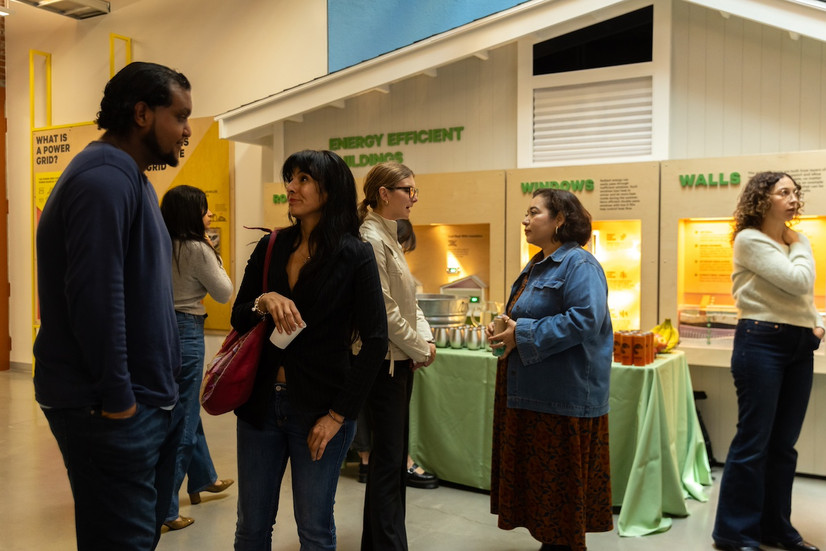LA Foodscapes | April 3, 2025 | LA Cleantech Incubator
On April 3, 2025, the Los Angeles Food Policy Council (LAFPC) hosted its fourth installment of LA Foodscapes: Conversations at the Intersections of Food, People, and the Land at the LA Cleantech Incubator. This event, titled Tech-Powered Solutions for an Inclusive & Resilient Food System, brought together innovators, community leaders, and funders to explore how technology can drive equity, resilience, and sustainability in our regional food system.
The evening centered on how emerging tech tools—from software and hardware to data systems and investment strategies—can support healthier communities, uplift small and BIPOC-owned food businesses, and combat climate change.
Setting the Stage
LAFPC’s Executive Director, Alba Velasquez, opened the evening with powerful remarks about the need for innovation that is rooted in equity. She emphasized the importance of cross-sector collaboration and keeping food justice at the center of our climate and technology conversations.

A Conversation with Innovators
Moderated by Noramay Cadena, Managing Partner at Supply Change Capital, the dynamic panel featured four visionary speakers who are reshaping our food system through innovation and impact:
Maen Mahfoud, Founder & CEO of Replate, spoke about using technology to redirect surplus food from businesses to right communities in need—tackling both food waste and food insecurity with a scalable, data-driven model.
Brent Taylor, Entrepreneur and former Co-founder of Beyond Meat, reflected on lessons from building mission-driven companies that use science and tech to improve human health and reduce the environmental impacts of food production.
Sabrina Williams, Founder of SEEDBOX, shared how her organization is using modular farm infrastructure and tech-enabled growing systems to bring hyper-local food production to urban communities, with a focus on equity and access.
Noramay Cadena also added her unique perspective as a venture capital leader working to fund and elevate diverse founders transforming the food landscape through technology.
Together, the panelists discussed what it takes to build a food tech ecosystem that works for everyone—not just through innovation, but through intention, equity, and community collaboration.
On-the-Ground Innovation: A Demo from SEEDBOX
Following the panel, Sabrina Williams led a live demonstration of SEEDBOX’s technology—giving attendees a hands-on look at how modular, smart-controlled farming systems can empower local growers and institutions to produce fresh food anywhere. Designed for adaptability, SEEDBOX units are solar-powered, Wi-Fi enabled, and equipped with environmental sensors that optimize plant growth while conserving water and energy. The demonstration illustrated how tech-forward solutions can be both scalable and deeply rooted in community needs.
Building the Ecosystem Together
This panel was made possible thanks to thoughtful input and support from members of our LA Foodscapes Advisory Group: Larta Institute, Angel City Advisors, Sustainable Agriculture and Food Systems Funders, and Vesta Food Service. Their guidance helped shape the conversation and ensure that the dialogue reflected the complex realities and aspirations of Los Angeles' food system stakeholders.
Thank You to Our Sponsors
This event—and the broader LA Foodscapes series—would not be possible without our generous partners. A special thank you to Cedars-Sinai for providing seed funding to launch this inaugural series in 2024.
We reside, work, and cultivate food
on unceded Indigenous homelands.
We acknowledge and honor the descendants of the Tongva, Kizh, and Gabrieleño peoples as the traditional land caretakers of Tovaangar (the Los Angeles Basin and the Southern Channel Islands). We pay our respects to the Honuukvetam (Ancestors), ‘Ahiihirom (Elders) and ‘Eyoohiinkem (our relatives/relations) past, present and emerging.
As part of a greater foodshed, we would also like to pay respect to and honor the Chumash, Tataviam, Serrano, Kitanemuk, ʔíviĨuqaletem, Acjachemen, Payómkawichum, and any other tribal group possibly not mentioned. As a Food Policy Council for Los Angeles we recognize this land acknowledgment is limited and engagement is an ongoing process of learning and accountability. To learn more about these First Nations, visit here.









































